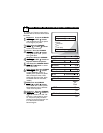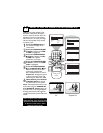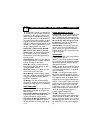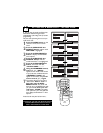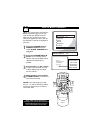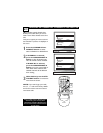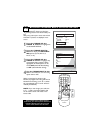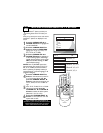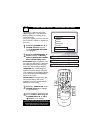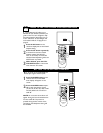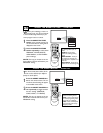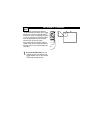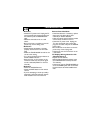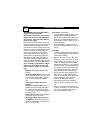
CARE AND CLEANING
WARNING Concerning Stationary
Images on the TV Screen:
Do not leave stationary or letterbox
images on screen for extended peri-
ods of time. This can cause uneven
picture-tube aging.
Normal use of the TV should involve the
showing of pictures that contain constantly
moving and changing images that fill the
screen. Be careful not to leave nonmoving
images on screen for extended periods of
time, or to display the same images on
screen too frequently, because subtle
ghost images can be left on the picture
tubes. Sources of stationary images may
be DVD disks, laser disks, video games,
CD-i disks, videotapes, digital television
boxes, broadcast channels, cable channels,
satellite channels, and others. Here are
some examples of stationary images
(this is not an all-inclusive list; you
may encounter others in your view-
ing):
• DVD menus—listings of DVD disk
content
• Letterbox black bars—shown at the
top and bottom of the TV screen when
a wide screen (16:9) movie is viewed
on a TV with standard (4:3) aspect
ratio.
• Video-game images and score-
boards
• Television station logos—present a
problem if they are bright and station-
ary; moving or low-contrast graphics
are less likely to cause uneven aging of
the picture tube
• Stock-market tickers—presented at
the bottom of the TV screen
• Shopping channel logos and pric-
ing displays—bright and shown con-
stantly or repeatedly in the same loca-
tion on the TV screen.
P
LACEMENT OF THE TV
• To avoid cabinet warping, cabinet color
changes, and increased chance of set
failure, do not place the TV where tem-
peratures can become excessively hot;
for example, in direct sunlight or near a
heating appliance.
• Be sure to allow a free flow of air to
and from the perforated back cover of
the set.
C
LEANING
• To avoid possible shock hazard, be sure
the TV is unplugged from the electrical
outlet before cleaning.
• Regularly dust the TV with a dry, non-
scratching duster to keep the TV clean.
• When cleaning the TV, take care not to
scratch or damage the screen surface.
Avoid wearing jewelry or using anything
abrasive. Do not use household clean-
ers. Wipe the front screen with a clean
cloth dampened with water. Use even,
easy, vertical strokes when cleaning.
• Gently wipe the cabinet surfaces with a
clean cloth or sponge dampened in a
solution of cool, clear water and a mild
soap or detergent. Use a clean, dry
cloth to dry the wiped surfaces.
• Occasionally vacuum the ventilation
holes or slots in the back cover of the
set.
• Never use thinners, insecticide sprays,
or other chemicals on or near the cabi-
net, as they might cause permanent
marring of the cabinet finish.
29



